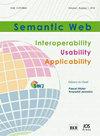语言关联数据最新进展特刊社论
IF 3
3区 计算机科学
Q2 COMPUTER SCIENCE, ARTIFICIAL INTELLIGENCE
引用次数: 0
摘要
自2010年开放语言学工作组成立以来,在将语言资源转化为关联数据方面进行了大量努力。语言关联数据(LLD)的研究领域在重要性、可见度和影响力方面都有所提高,语言关联开放数据(LLOD)云目前聚集了200多个资源。随着这种增长,新的挑战出现了,涉及到特定的领域和任务应用、质量维度和需要考虑的语言特征。本期特刊旨在回顾和总结近年来LLD研究的进展和现状,并对未来几年该领域面临的挑战提供理解。本期的论文表明,在更广泛的社区采用LLD方面仍有一些问题需要解决,以及缺乏特定任务和(跨学科)领域的资源。同样,将LLD资源整合到自然语言处理(NLP)体系结构中,并寻找长期的基础设施解决方案来托管LLD资源,仍然是研究领域可预见的未来需要关注的要点。本文章由计算机程序翻译,如有差异,请以英文原文为准。
Editorial of the Special Issue on Latest Advancements in Linguistic Linked Data
Since the inception of the Open Linguistics Working Group in 2010, there have been numerous efforts in transforming language resources into Linked Data. The research field of Linguistic Linked Data (LLD) has gained in importance, visibility and impact, with the Linguistic Linked Open Data (LLOD) cloud gathering nowadays over 200 resources. With this increasing growth, new challenges have emerged concerning particular domain and task applications, quality dimensions, and linguistic features to take into account. This special issue aims to review and summarize the progress and status of LLD research in recent years, as well as to offer an understanding of the challenges ahead of the field for the years to come. The papers in this issue indicate that there are still aspects to address for a wider community adoption of LLD, as well as a lack of resources for specific tasks and (interdisciplinary) domains. Likewise, the integration of LLD resources into Natural Language Processing (NLP) architectures and the search for long-term infrastructure solutions to host LLD resources continue to be essential points to which to attend in the foreseeable future of the research line.
求助全文
通过发布文献求助,成功后即可免费获取论文全文。
去求助
来源期刊

Semantic Web
COMPUTER SCIENCE, ARTIFICIAL INTELLIGENCEC-COMPUTER SCIENCE, INFORMATION SYSTEMS
CiteScore
8.30
自引率
6.70%
发文量
68
期刊介绍:
The journal Semantic Web – Interoperability, Usability, Applicability brings together researchers from various fields which share the vision and need for more effective and meaningful ways to share information across agents and services on the future internet and elsewhere. As such, Semantic Web technologies shall support the seamless integration of data, on-the-fly composition and interoperation of Web services, as well as more intuitive search engines. The semantics – or meaning – of information, however, cannot be defined without a context, which makes personalization, trust, and provenance core topics for Semantic Web research. New retrieval paradigms, user interfaces, and visualization techniques have to unleash the power of the Semantic Web and at the same time hide its complexity from the user. Based on this vision, the journal welcomes contributions ranging from theoretical and foundational research over methods and tools to descriptions of concrete ontologies and applications in all areas. We especially welcome papers which add a social, spatial, and temporal dimension to Semantic Web research, as well as application-oriented papers making use of formal semantics.
 求助内容:
求助内容: 应助结果提醒方式:
应助结果提醒方式:


